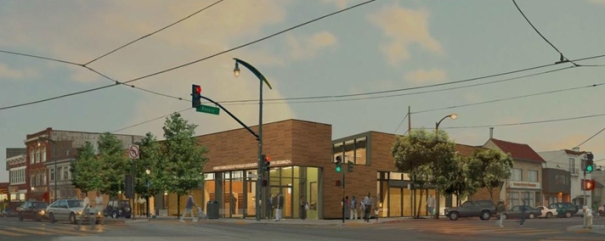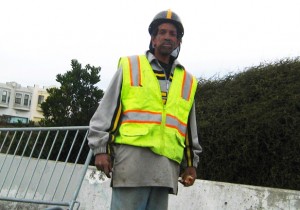
Architect's rendering of new Bayview Library; contract to build it was snatched from Black-owned Liberty Builders, the low bidder, and given to a white contractor with no Black participation
by Joseph Debro
Dec. 2, 2010
The Bayview Library, at Third and Revere, the center of San Francisco’s Black heartland, has long served as a second home for the children and all the people of Bayview Hunters Point. Now the City wants to replace it with a new building, but who will build it? Low bidder on the project was Liberty Builders, located a block from the library and owned by Bay View publisher Willie Ratcliff, who is trusted to hire from the community. But the City just snatched the contract from Liberty and gave it to KCK Builders, a white contractor with no Black participation. Will the community allow KCK to build the library?
The construction industry is infected with the pathology of racism. This infection is chronic. It first occurred in 1867. At that time the practitioners were injecting racism to protect those white people who had less skill than the newly freed slaves who were forced to ply their skills for less money.
Over the years, this infection has evolved under local and national laws. These laws have favored those who bring legacy to the game. Big unions and big contractors have conspired to restrict the number of contractors and workers who may enter the industry. These restrictions do not apply to familial relationships.

Darrell Evans is a member of Liberty’s first crew in 12 years, working on street repairs on Williams Avenue in Bayview Hunters Point. It was 12 years ago that the noose was hung on Liberty’s jobsite at SFO, signaling the lockout of Blacks from construction in San Francisco that has continued ever since. Liberty is owned by Bay View publisher Willie Ratcliff. – Photo: Francisco Da Costa
There is in law a requirement for something called the joint apprenticeship council. This council is composed of big unions and big contractors. Its effective role is to restrict the membership of unions by limiting training opportunities. These training opportunities are generally limited to relatives and friends of those who control the process.
These whites only-organizations can and have limited the number of Blacks admitted to the training programs. Once a limited number of Blacks are admitted to the unions, dispatch is used to limited the work opportunities. Dispatch is the method of placing union members on the job. Those who run the unions make the decisions on who works and who does not. Who gets good workers and who does not.
Constitutional law and local laws are used to limit the number of contractors. Bonds and insurance are required for bidding and for contracts in the public sector. The private sector is closed by practice. Only White contractors are welcome in the private sector. The private sector does not require bonds. Bonds are only required by government contracts.
As I have stated in previous essays, government has requirements not practiced by other sectors of our economy. The government allows unions to set the rules of competition. These rules are designed to use poor people to attract federal money to an urban venue, then to exclude these same people from becoming union members and contractors.
The only open construction opportunity for descendants of former slaves lies in the public sector. The rules of engagement in the public sector are such that elimination is practiced without contest. Insurance requirements are arbitrarily imposed. The bid bond requirement prevents most small contractors from bidding. When this requirement is waived, as it should be, and a small contractor is low bidder, the bond required to perform the work is almost impossible to acquire. The federal government guarantees insurance companies against loss. Yet the bonding companies continue to discriminate.
In the case of the contract to build the new Bayview Library, the City of San Francisco first showed the citizens of Bayview Hunters Point its contempt for them by going out of state to find a white firm to design this structure for a Black community. Let’s assume this structure was being built in Chinatown. Do you think that the City would have contracted with any but a Chinese designer? I think not.
The City then bid this contract in such a way that any contractor could win, without respect to its employment history. A Black contractor with a history of hiring and training Black youngsters was the low bidder. This contractor was awarded the contract and subsequently disqualified for a reason that was correctable. The second lowest bidder was then awarded the contract. This contractor has no history of subcontracting with Blacks. He submitted with his bid no subcontractors who are Black.
Once again our community is disrespected. Rather than making a requirement that the contractor have a history of training and employing Black people, the City showed no interest in the contractor’s history. If we allow the City to contract in this way, it is on us. Bayview Hunters Point is our turf. Dope dealers know how to protect their turf. Perhaps we can learn from them.
Joseph Debro is president of Bay Area Black Builders, co-founder of the National Association of Minority Contractors, a general engineering contractor and a bio-chemical engineer. He can be reached at transbay@netzero.com.
Mary Ratcliff, editor
SF Bay View
(415) 671-0789
http://sfbayview.com/2010/san-francisco-locks-blacks-out-from-building-our-own-library/
Also read “Union PLA’s Block Blacks from Construction,” at http://sfbayview.com/2010/union-plas-block-blacks-from-construction/ by Harry C. Alford, co-founder, president and CEO of the National Black Chamber of Commerce.




